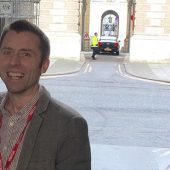
Malte Ziewitz
Oxford Internet Institute, University of Oxford
Project role: Research Assistant

The project’s final report is available to download.
Over the past decade the Internet has become a vital part of everyday life for the majority of Europeans and over two billion people across the world. This is likely to expand to seven billion by 2020 as the sophistication in mobile phone technology transforms them into Internet access devices. Furthermore, the growth of connectivity of Internet-enabled devices, eg the Internet of things, will increase this substantially. This explosion in connectivity will redefine the very nature of the Internet and, most importantly, the fabric of social, cultural, political and economic institutions globally.
The permeation of the Internet in all socio-economic dimensions of our lives has led to an increasing dependency which inevitably breeds deep potential vulnerabilities. These are both technical, eg security and resilience, and legal, eg privacy and trust, which brings into focus the urgency for governance and regulation. On the other hand, it is also true that the Internet’s bottom-up evolutionary development and relative lack of protection and regulation has made possible the flourishing of innovative applications and unprecedented possibilities, with huge societal and economic repercussions.
This study aimed to investigate the links between technological, social and economic trends related to the future Internet, explore the future needs of Internet users, and outline the principles that should guide its future development.
The study identified four pervasive forces which will impact the future Internet:
Together, they point to a key question: “How can we guide the evolution of the Internet so that it best serves the needs of society?”
The study addressed this question through several foresight techniques – environmental scanning, an online Delphi survey of experts and scenario analysis – to identify and analyse trends, drivers of change, future needs, technological options and likely socio- economic impacts. With input from the Delphi results, trend analysis and workshop discussions, we constructed and refined four scenarios of plausible future socio-economic conditions with differing needs:
At expert workshops in Brussels, Cambridge, MA (MIT) and Tokyo (Keio University) we used the scenarios to stimulate wide-ranging discussions about the main trends and drivers of future Internet needs.
This is a European Commission DG INFSO project SMART 2008/0049.

Oxford Internet Institute, University of Oxford
Project role: Research Assistant

Former Research Fellow
Project role: Project Manager
Professor Ian Brown was Professor of Information Security and Privacy at the OII. His research is focused on surveillance, privacy-enhancing technologies, and Internet regulation.

Project role: Expert

Economics Department, University of Warwick
Project role: Expert

Project role: Expert

Project role: Expert

Project role: Expert

Project role: Expert